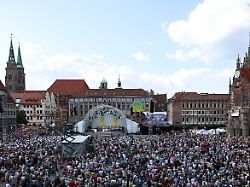Church Day in Nuremberg
Bedford-Strohm calls for a social change of course
06/07/2023, 7:01 p.m
“We don’t want to live against each other in the world” – the Protestant Church Congress begins with this request. State Bishop Bedford-Strohm advocated giving new answers to the questions of happiness and contentment. More than 2000 events are planned in Nuremberg until Sunday.
At the start of the 38th German Evangelical Church Congress, the Bavarian Evangelical Bishop Heinrich Bedford-Strohm called on society to radically change its goals. “We will no longer base our happiness on growth in material wealth, but on growth in relationship wealth,” he said. “We will no longer judge our freedom by how high the speedometer is allowed to go, but rather that we move in accordance with Creation”.
“Yes, we want to realign our lives, from now on. We don’t want to live against each other in the world, but with each other. And we want to hope,” he said in his sermon at the opening service in Nuremberg. Climate change is now forcing us to rethink – and to fight. “Fight for our children. They should drink clear water, they should enjoy butterflies.” The multi-day meeting of faith officially began with the service. “The Kirchentag is open,” said the President of the Kirchentag, Thomas de Maizière, to the applause of those who attended the service.
Söder defends state services
Bavaria’s Prime Minister Markus Söder initially rejected a replacement of state services for the churches in Germany. He was against banning the church from public life. The money is state consideration for the expropriation of German churches and monasteries at the beginning of the 19th century as part of secularization. With the exception of Hamburg and Bremen, all federal states therefore pay an annual sum to the Catholic and Protestant churches. Most recently it was around 550 million euros per year.
Before the start of the meeting, there had been criticism that the Kirchentag, for which, according to the organizers, around 60,000 tickets had been sold by the start, was also being financed from public funds. According to the head of the Kirchentag, Stephan Menzel, the Kirchentag has a budget of 20.5 million euros for two years. This includes 5.6 million euros from the Bavarian state church, 5.5 million euros from the Free State of Bavaria and 3 million euros from the city of Nuremberg. Up to one million euros in non-cash benefits can also be added. Church Congress President de Maizière responded to the criticism by thanking for the public donations. “That’s generous” and he also thinks it’s important, he said. “But it doesn’t come naturally.”
2000 events – 100,000 visitors
Around 2,000 events for the more than 100,000 visitors expected at the Kirchentag will be offered up until Sunday – primarily in Nuremberg, but also in the neighboring city of Fürth. “Now is the time” is the motto of the great faith meeting, it comes from the Gospel according to Mark. The core topics include climate and environmental protection. The chairwoman of the council of the Evangelical Church in Germany, Annette Kurschus, cannot take part in the church congress due to a corona disease.
In addition to a variety of spiritual, religious and cultural topics, politics is also one of the focal points of the program. Intergenerational justice, international security policy and arms deliveries will be discussed on the main podiums of the Kirchentag. Chancellor Olaf Scholz is expected to speak in the Frankenhalle on Saturday.
